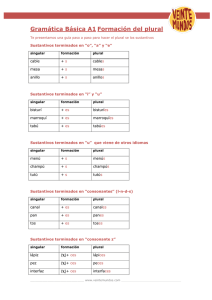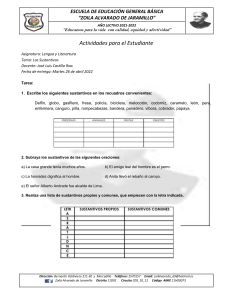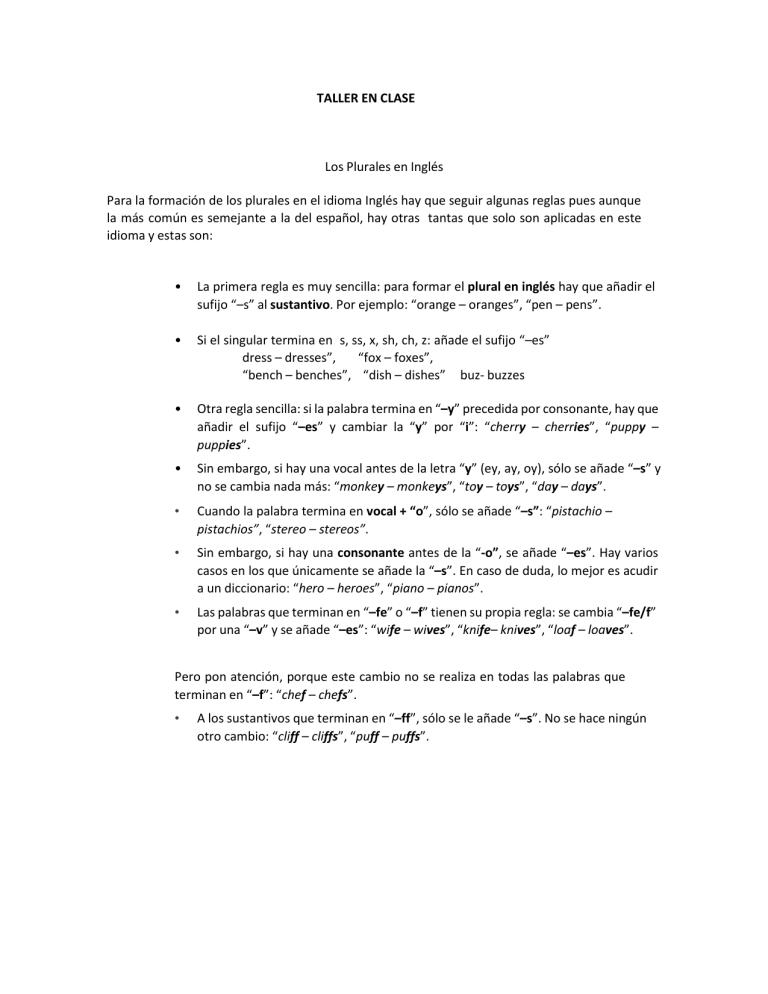
TALLER EN CLASE Los Plurales en Inglés Para la formación de los plurales en el idioma Inglés hay que seguir algunas reglas pues aunque la más común es semejante a la del español, hay otras tantas que solo son aplicadas en este idioma y estas son: • La primera regla es muy sencilla: para formar el plural en inglés hay que añadir el sufijo “–s” al sustantivo. Por ejemplo: “orange – oranges”, “pen – pens”. • Si el singular termina en s, ss, x, sh, ch, z: añade el sufijo “–es” dress – dresses”, “fox – foxes”, “bench – benches”, “dish – dishes” buz- buzzes • Otra regla sencilla: si la palabra termina en “–y” precedida por consonante, hay que añadir el sufijo “–es” y cambiar la “y” por “i”: “cherry – cherries”, “puppy – puppies”. • Sin embargo, si hay una vocal antes de la letra “y” (ey, ay, oy), sólo se añade “–s” y no se cambia nada más: “monkey – monkeys”, “toy – toys”, “day – days”. • Cuando la palabra termina en vocal + “o”, sólo se añade “–s”: “pistachio – pistachios”, “stereo – stereos”. • Sin embargo, si hay una consonante antes de la “-o”, se añade “–es”. Hay varios casos en los que únicamente se añade la “–s”. En caso de duda, lo mejor es acudir a un diccionario: “hero – heroes”, “piano – pianos”. • Las palabras que terminan en “–fe” o “–f” tienen su propia regla: se cambia “–fe/f” por una “–v” y se añade “–es”: “wife – wives”, “knife– knives”, “loaf – loaves”. Pero pon atención, porque este cambio no se realiza en todas las palabras que terminan en “–f”: “chef – chefs”. • A los sustantivos que terminan en “–ff”, sólo se le añade “–s”. No se hace ningún otro cambio: “cliff – cliffs”, “puff – puffs”. ¿Qué otros sustantivos conoces que terminen en “–fe/–f/–ff”? d Sustantivos irregulares en inglés Como ya habrás podido adivinar, los sustantivos irregulares son sustantivos que no siguen las reglas generales a la hora de formar sus plurales. Por eso se llaman plurales irregulares y hay que aprenderlos y memorizarlos. Fíjate en la siguiente lista de los sustantivos irregulares más comunes: • child – children • person – people • man – men • woman – women • tooth – teeth • foot – feet • mouse – mice • goose – geese • ox – oxen Hay muchas palabras que provienen del latín o del francés que siguen suspropias reglas para formar el plural: “basis – bases”, “radius – radii”, etc. • Para concluir, hay sustantivos en los que no hay que cambiar nada en la palabra, es decir, el plural y el singular son la misma palabra: Singular Plural • Deer deer • Sheep sheep • Fish fish • Means means • Species species • Series series • Ice ice EXERCISE 1. Change into the plural and translate them (coloca las siguientes frases en plural y tradúcelas) ( el numero 1 es un ejemplo) 1-A child under twelve is not allowed to see this film. Children under twelve are not allowed to see this film. Los niños menores de doce años no pueden ingresar a esta película. 2-A man is looking at the film poster. 3-This baby has got one tooth. 4- This actress is really beautiful. 5- That actor usually dresses as a cowboy. 6-A sheriff saw the thief. 7- There is only one wolf on the prairie. 8- This woman owns a ranch in the Farwest. 9- A buffalo is drinking water from the lake. 10-A famous person life is an interesting piece of news. 11-The book is on the table. 12-A man is picking up a leaf. 13This piano is very expensive. 14-That knife was used by the thief. 15. There is only one shelf in his bedroom. EXERCISE 2. Traduce las frases, resalta los plurales, sácalos aparte y escríbeles al frente el singular. El número 1 es un ejemplo 1. The glasses are in the kitchen: los vasos están en la cocina. Glasses glass • • • • • • • • • • • • • • • • • • • • • • • • • • The churches are near The buses are at the corner. The watches are new. The dishes are broken. The boxes are empty. The classes begin at ten o’clock. The children play in the garden every afternoon. There are many men working in the street. My feet hurt. There are mice in the basement. They are young women. Both salesmen offer a discount. He has two rotten teeth. Our families meet once a month. We were invited to two parties. They take care of the puppies. There are five libraries in the city. Both countries reached an agreement. Babies sleep a lot. There are many flies. The skies of my country are beautiful. Companies are saving costs. The cities spend a lot of electricity The keys are on the table. The boys are running in the park. They are looking for their toys. • • • • • • • • • • • • • • • • • The trays are broken. The knives are next to the dish. Wolves are very fierce. The thieves were captured. The shelves are dirty We have four halves. The leaves are falling. Our wives are talking. Elves are common characters in movies. The calves are in my uncle’s farm. I think we all deserve to live two lives at least. I like to eat potatoes I don’t like to eat tomatoes. There are several volcanoes in my country. They are my heroes. (Ellos son mis héroes) He eats mangoes every day You wrote two zeroes.
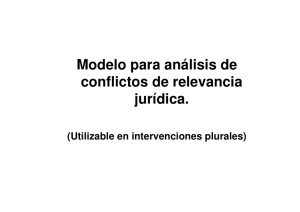
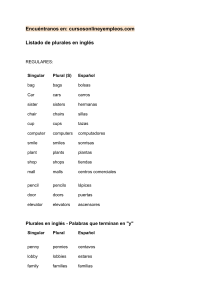
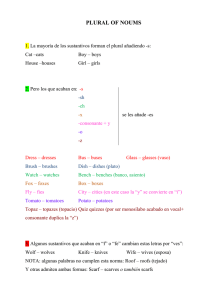
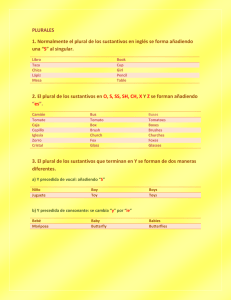
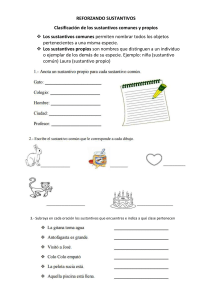
![Temario PRELIMINARY ENGLISH TEST COURSE [PET] • Tiempos](http://s2.studylib.es/store/data/007119388_1-02bfad3b45aedc6a7114b395910afd48-300x300.png)
